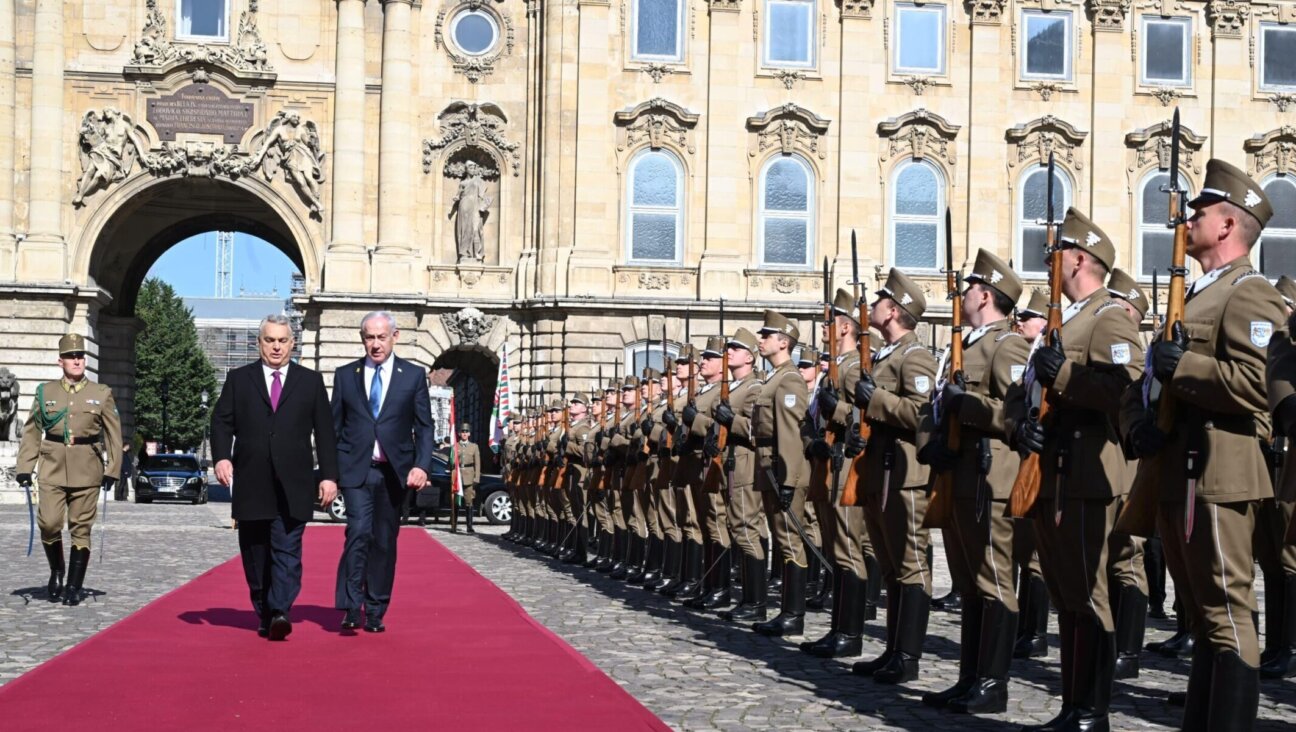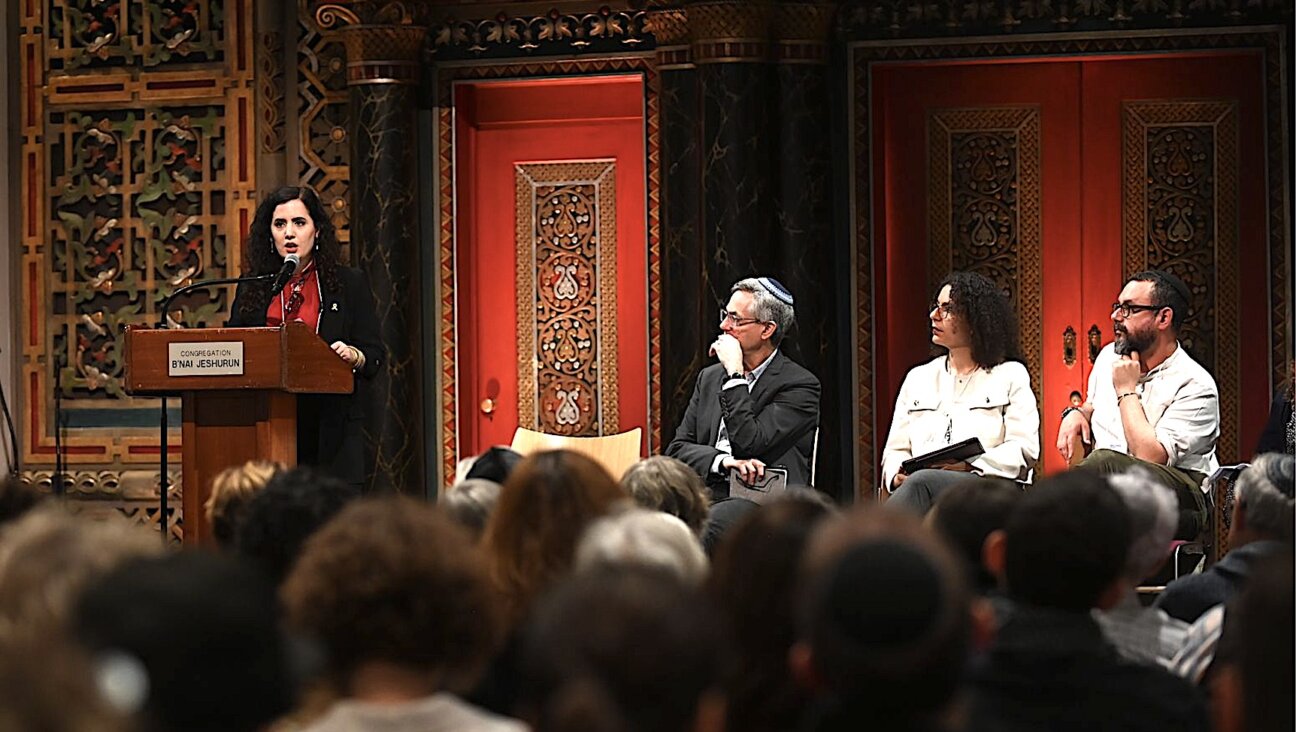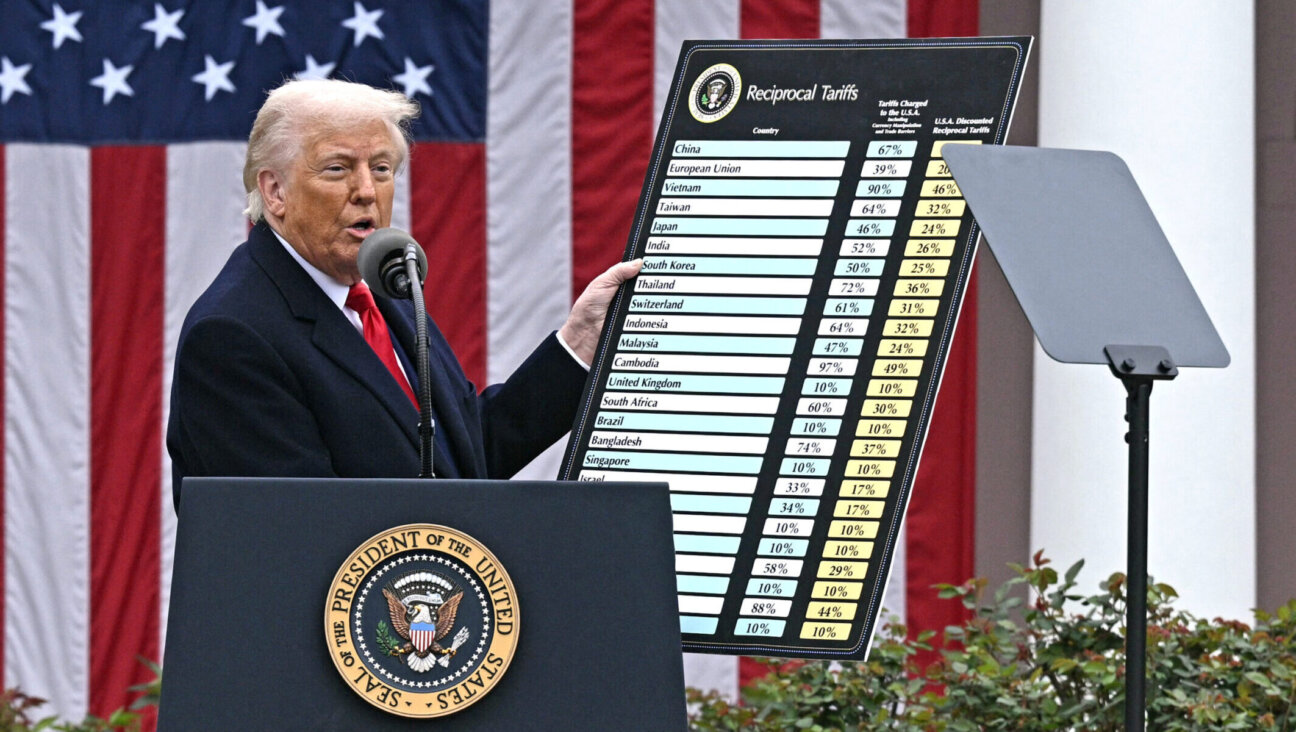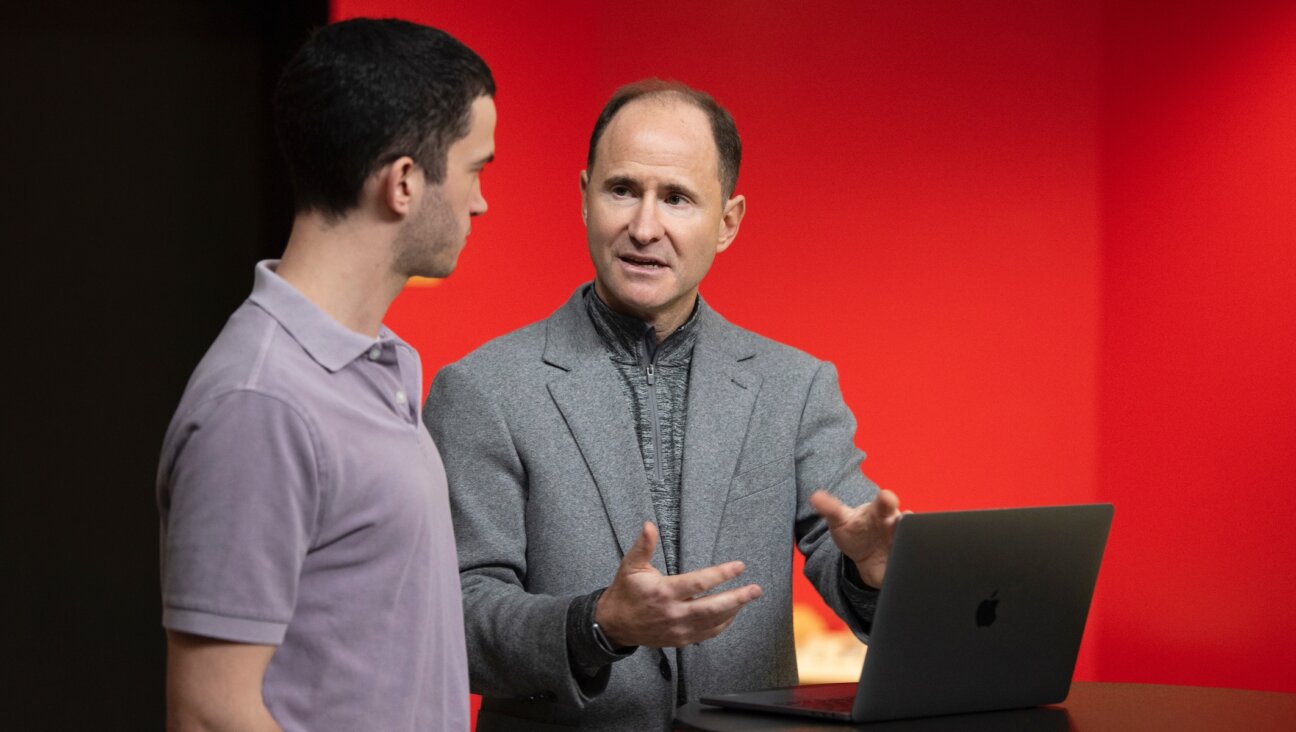Rethinking Wagner in the Operatic Heart of ‘Germania’
In presenting the Cultural Prize, Munich’s highest honor, to Sir Peter Jonas in January, the city’s mayor praised the general director of the 351-year-old Bavarian State Opera for “treating the arts not as an incidental but as a central concern of an enlightened modern society… not only to preserve tradition, but also to locate it in the modern context.”
Art, Jonas told the Forward, must engage a social conscience. “The opera house is a forum of artistic ideas and theatrical energy,” he explained, “and does not attempt to be a place of entertainment or relaxation.”
Knowing Jonas’s philosophy, the Munich City Council expected change when it brought him to the city — but just how much surprised everyone. Modernizing basic repertory is one thing, but reforming the house’s god, Richard Wagner, was quite another. This, after all, is the house that premiered Wagner’s “Die Meistersinger,” “Tristan und Isolde,” “Das Rheingold” and “Die Walküre.”
When Jonas took his position at the Bavarian State Opera in 1993, his welcome was not immediate. Jonas is not only the first non-German to oversee this, the world’s busiest opera house, but also the first Englishman to head any opera house in Germany. His father was a German Jew who was interned in England as an enemy alien during World War II, and his mother was a Lebanese Eastern Orthodox Christian born in Jamaica. Born in London in 1946, he was raised as a Catholic, but over the years he learned more about Judaism and has grown closer to the Jewish side of his family. Indeed, the relative to whom he feels closest is an aunt living in Connecticut who escaped Nazi Germany as a child on the first kindertransport.
“The first few years were really difficult,” he said, recalling his initial reception in Munich, “because of prejudice and racism, coming from England, and with a German-Jewish background.”
Nonetheless, he stuck to his ideals. In his first season, he hired American director David Alden and two Israeli designers, Roni Toren (sets) and Buki Shiff (costumes), for what turned out to be a landmark new production of Wagner’s “Tannhäuser.” Radically reworking the plot, Wagner’s mythic struggle between “holy German art” and the pleasures of the flesh was deliberately deconstructed as an inner battle for the German soul, focusing on the nightmarish Nazi past. A huge sign reading “Germania Nostra” was hung over the performers; shocking symbols recalled the Nazi period and the set in the last act was eerily suggestive of the pierced entrance wall of a concentration camp. (The production can be seen on DVD, conducted by Jonas’s music director, Zubin Mehta.)
“We deliberately use the word ‘Germania,’ the idea, the seeking of pan-Germanism, as opposed to ‘Deutschland,’ the place,” he explained. “When those words ‘Germania Nostra’ appear in the second act, look at the faces around you and you will see the shock of recognition.”
Predictably, the opening-night audience greeted Jonas with a barrage of boos, but there were just as many shouts of bravo. Jonas considers “Tannhäuser” one of the great accomplishments of his career, and the first performance one of the most memorable of his life. He says that more than a decade after the premiere, his “Tannhäuser” has become one of the house’s most popular productions and a particular favorite of the performers. The audience, however, is still divided between outrage and enthusiasm — although no one is indifferent to having witnessed a vital experience.
It was with great anticipation, then, that an entirely new production of “Die Meistersinger” debuted last month. Munich is especially proprietary about this opera because it hosted the premiere. It has become tradition to end every season with a performance of it, although reverberations have not ceased from one particularly infamous 1933 performance, conducted by Hans Knappertsbusch in honor of Hitler, with the musicians and the entire audience at the end singing the “Deustchlandlied,” complete with “Sieg Heil” salutes.
Unlike “Tannhäuser,” this new “Meistersinger” does not rewrite the plot. Rather, director Thomas Langhoff has stripped the work of all reminders of faux-medieval Germany and plunked it down in the internationalized present. Witty references aside — laptop computers, Internet Web addresses and red high-heeled shoes are featured prominently — without its historic baggage, the production clarifies the opera. However, as usual, Jonas goes further by invoking Germany’s dark past. The riot in the second act, normally filled with tame midsummer-night hijinks, instead features skinheads wearing S.S. T-shirts and wreaking havoc, leaving their victims in need of bandages through the final act. The thugs even return during the triumphant finale, ready to exploit any momentary lapse to unleash their violence and terror. The skinheads are the only specifically German element now left onstage, in an opera normally smothered in German symbols.
Waggishly, Jonas defends his iconoclasm by quoting Wagner himself: “Kinder, macht neues! Neues! Und abermals neues!” (“Children, make new! New! And always new!”)
Jonas’s work is not limited to the 2,100-seat National Theatre — built in 1818, bombed in 1943, and rebuilt between 1956 and 1963, almost exactly as before. He oversees two other opera houses nearby: the impressive 1901 amphitheater-style Prinzregenten Theatre on the other side of the Isar River, and the Cuvilliès Theatre, an amazing 18th-century rococo jewel where Mozart premiered his “Idomineo,” which is now used for special productions.
And Jonas’s innovations have not been limited to Wagner and the standard repertory. He has also been passionate about reviving the baroque operas of Monteverdi, Handel and others, as well as commissioning new works.
At Jonas’s insistence, one of the highlights of Munich’s July Festival this summer was a gala klezmer concert to benefit the new Jewish Center under construction in the heart of the city. Together with Mehta, he has arranged important opportunities for many talented Jewish and Israeli artists. The Bavarian State Opera’s graphics during his tenure have been the work of Pierre Mendel, and one of Jonas’s proudest accomplishments is that nine of Mendel’s posters are in the permanent collection of the Museum of Modern Art in New York. Mendel had escaped the Nazis, getting to America; he was sent back to Munich as a G.I. and decided to stay.
Jonas, who previously ran the Chicago Symphony and the English National Opera, has been in Munich for 11 years and will remain for two more. Despite the controversies his productions have aroused — or perhaps because of them — he has affected the hearts and minds of Bavaria to a remarkable extent, and even may be said to be beloved. But he says his philosophy remains simple: “One word: survival.”
The Forward is free to read, but it isn’t free to produce

I hope you appreciated this article. Before you go, I’d like to ask you to please support the Forward.
At a time when other newsrooms are closing or cutting back, the Forward has removed its paywall and invested additional resources to report on the ground from Israel and around the U.S. on the impact of the war, rising antisemitism and polarized discourse.
Readers like you make it all possible. We’ve started our Passover Fundraising Drive, and we need 1,800 readers like you to step up to support the Forward by April 21. Members of the Forward board are even matching the first 1,000 gifts, up to $70,000.
This is a great time to support independent Jewish journalism, because every dollar goes twice as far.
— Rachel Fishman Feddersen, Publisher and CEO
2X match on all Passover gifts!
Most Popular
- 1

News A Jewish Republican and Muslim Democrat are suddenly in a tight race for a special seat in Congress
- 2

Fast Forward The NCAA men’s Final Four has 3 Jewish coaches
- 3

Film & TV What Gal Gadot has said about the Israeli-Palestinian conflict
- 4

Fast Forward Cory Booker proclaims, ‘Hineni’ — I am here — 19 hours into anti-Trump Senate speech
In Case You Missed It
-

Fast Forward As Netanyahu arrives in Budapest, Hungary announces exit from International Criminal Court
-

Yiddish הונדערטער פֿרומע ייִדן לאַנצירן לינק־געשטימטע גרופּע אין מאַנהעטןHundreds of observant Jews launch left-wing group in Manhattan
הרבֿ יוסף בלאַו האָט בײַ דער קאָנפֿערענץ באַדויערט וואָס דער רעליגיעזער ציוניזם אין ישׂראל איז „פֿאַרכאַפּט געוואָרן“ פֿון די רעכטע.
-

Fast Forward Trump’s ‘Liberation Day’ includes 17% tariffs on Israeli imports, even as Israel cancels tariffs on US goods
-

Fast Forward Hillel CEO says he shares ‘concerns’ over campus deportations, calls for due process
-
Shop the Forward Store
100% of profits support our journalism
Republish This Story
Please read before republishing
We’re happy to make this story available to republish for free, unless it originated with JTA, Haaretz or another publication (as indicated on the article) and as long as you follow our guidelines.
You must comply with the following:
- Credit the Forward
- Retain our pixel
- Preserve our canonical link in Google search
- Add a noindex tag in Google search
See our full guidelines for more information, and this guide for detail about canonical URLs.
To republish, copy the HTML by clicking on the yellow button to the right; it includes our tracking pixel, all paragraph styles and hyperlinks, the author byline and credit to the Forward. It does not include images; to avoid copyright violations, you must add them manually, following our guidelines. Please email us at [email protected], subject line “republish,” with any questions or to let us know what stories you’re picking up.















